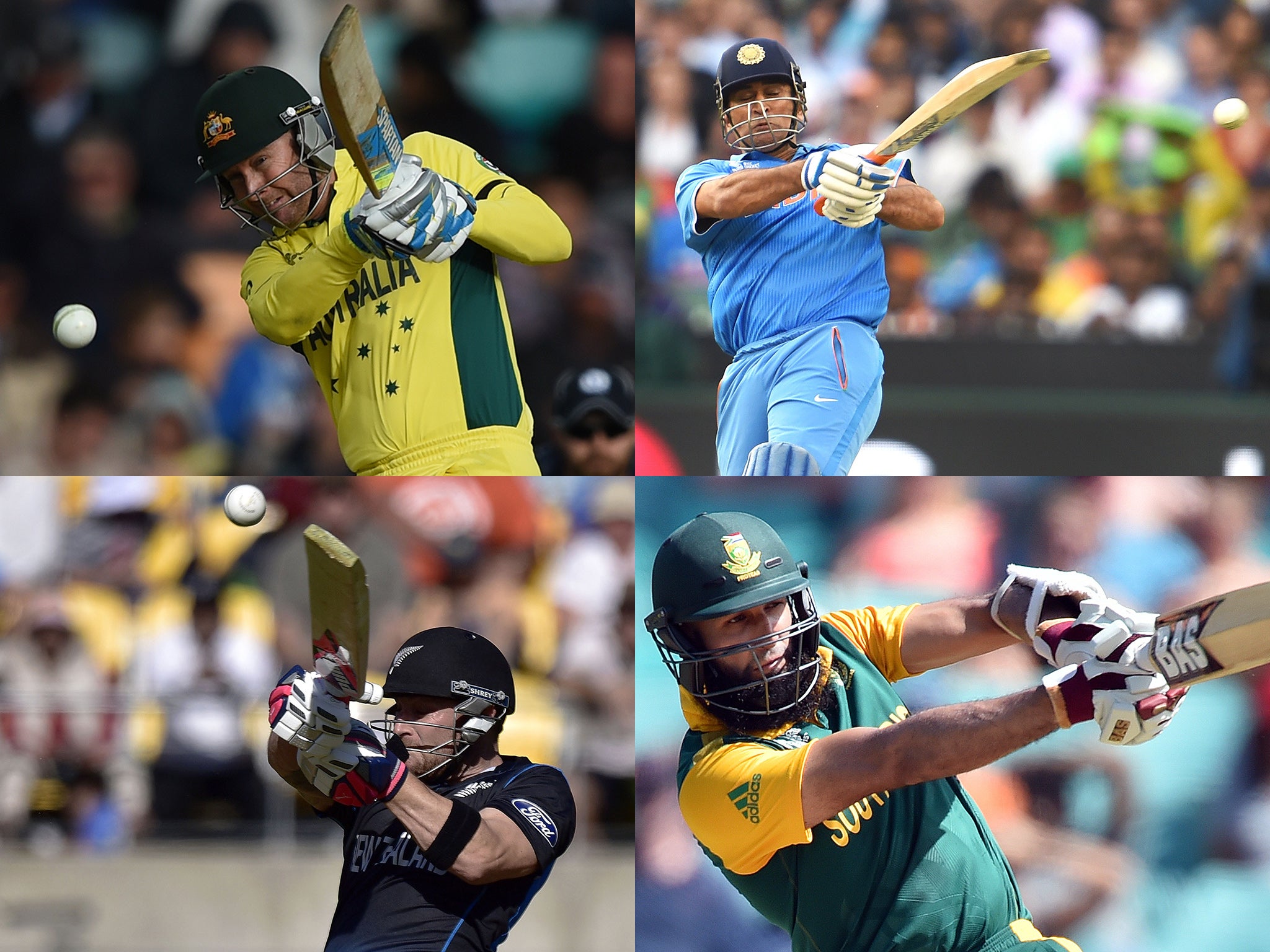Cricket World Cup 2015: Expect unexpected in final countdown
Australia face India and New Zealand play South Africa in final four

Your support helps us to tell the story
From reproductive rights to climate change to Big Tech, The Independent is on the ground when the story is developing. Whether it's investigating the financials of Elon Musk's pro-Trump PAC or producing our latest documentary, 'The A Word', which shines a light on the American women fighting for reproductive rights, we know how important it is to parse out the facts from the messaging.
At such a critical moment in US history, we need reporters on the ground. Your donation allows us to keep sending journalists to speak to both sides of the story.
The Independent is trusted by Americans across the entire political spectrum. And unlike many other quality news outlets, we choose not to lock Americans out of our reporting and analysis with paywalls. We believe quality journalism should be available to everyone, paid for by those who can afford it.
Your support makes all the difference.The Cricket World Cup has conjured a rarity: the best four teams in it are contesting the semi-finals. Usually, some slightly undeserving side or other manages to sneak through, but not in the 11th version of the tournament.
This may be simply because between Australia, India, New Zealand, South Africa and whoever follows there is daylight. This quartet has all appeared to understand what it meant to be ready in body and mind for one of the few one-day competitions that matters a jot.
Two of them, India and New Zealand, have won all seven games they have played. Australia have lost only one, in the most excruciating circumstances to New Zealand, and South Africa’s two defeats should not be taken as any sort of yardstick that they are anything but at the peak of their powers.
Something now has to give. If this event has been short of anything it is close matches, though the contest between the Antipodean rivals, with the Kiwis winning by a wicket, was one for the ages. Save for South Africa’s overwhelming victory over Sri Lanka, which was perhaps an ominous turn-up, the quarter-finals went more or less exactly as predicted.
Thus, anything could happen from here on, with the proviso that two of the combatants have home advantage. That, however, may be negated in Sydney on Thursday when Australia may feel as England have felt in Birmingham recently, that they are playing in a sub-continental outpost.
The first tie is between New Zealand and South Africa in Auckland on Tuesday. South Africa have won 36 of the 56 completed matches between them and as recently as last October gained two comfortable victories here. They will be thinking that time spent in reconnaissance is never wasted.
It may well offer a classic example of an irresistible force meeting an immoveable object. Brendon McCullum, New Zealand’s estimable captain, who has become a revered figure in his country in the past five weeks, has frequently repeated that his team will attack and keep on attacking.
They have deduced it is what they do best and so fearless have they become that nothing will dissuade them from it. As McCullum (above) conceded before West Indies were blown away, there is no plan B.
South Africa claim finally to have cast aside their reputation as the arch-chokers and their disdainful quarter-final dismissal of Sri Lanka lent credence to the notion. AB de Villiers, their captain, was confident enough to put a sceptical interrogator in his place by talking of when the team lifted the trophy, not if.
There is always the prospect of one side or other collapsing in a heap. It happened a fortnight ago when the Kiwis met Australia: both came out slugging and paid the penalty for it. South Africa, whatever they say, retain the capacity to fold. The nearer their heart’s desire gets, the more likely that this is to happen.
Neither country has reached a World Cup final. This is New Zealand’s seventh semi-final, including the last two tournaments. South Africa have been at this stage three times before. They were, successively, the victims of a rain interrupted injustice against England in 1992, the mother and father of all chokes against Australia in 1999 and the Australian steamroller in 2007, which was probably linked to what happened eight years previously.
The pitch at Auckland with its inviting leg-side boundaries seems certain to favour batsmen. Yet the largest first-innings total in its three matches so far is 287.
New Zealand had chased in five consecutive matches until yesterday, when they opted to bat. They will know that, while scores on the board still matter, nothing will daunt South Africa and their array of bludgeoners, led by De Villiers.
The key may lie in which fast bowlers are the more incisive and in which spinners, if any, can avoid being collared. New Zealand would be hugely popular finalists, South Africa a little less so.
India are the defending champions, Australia won the three World Cups before that. This a clash of the juggernauts, the big two on the field, two of the Big Three off it (along with England, who give the impression of determinedly trying to squeeze in on the top table without anyone else being sure what the heck they are doing there).
Australia’s swagger is less pronounced than usual, although they have made three of the highest seven totals in the competition. India have made history by bowling out their opponents in all their matches so far. It is simple then: if they do it again, they will win.
The batting on both sides will be of the 21st century. Australia, though, seem slightly more at ease with that.
Join our commenting forum
Join thought-provoking conversations, follow other Independent readers and see their replies
Comments